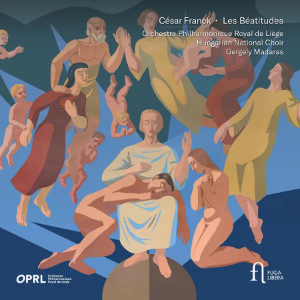
César Franck (1822-1890)
Les Béatitudes (1869-79)
Anne-Catherine Gillet (soprano), Héloïse Mas (mezzo-soprano), Eve-Maud Hubeaux (contralto), John Irvin and Artavazd Sargayan (tenors), David Bižić (baritone), Patrick Bolleire and Yorck Felix Speer (basses)
Hungarian National Choir
Orchestre Philharmonique Royal de Liège/Gergely Madaras
rec. live, 10 & 12 December 2022, Salle Philharmonique, Liège, Belgium
French text and English translation available online
Fuga Libera FUG817 [2 CDs: 119]
Franck regarded his oratorio Les Béatitudes as his most important work. Along with the opera Hulda it is also his longest, running to two hours. He worked on it for ten years, from 1869 to 1879, but he never heard it complete. Passages of it were performed in occasional concerts, sometimes with just piano accompaniment but the complete premiere with orchestra took place only the year after the composer’s death. Subsequent performances seem to have been rare and I am aware of only two other recordings. This one was made in 2022, as part of the celebrations of the bicentenary of Franck’s birth, and it is the first for over thirty years. Liège was Franck’s birthplace so it is entirely fitting that their orchestra should undertake this work.
The work is a meditation on the eight beatitudes from the fifth chapter of St Matthew’s gospel. These are fleshed out with a text by Josephine Colomb, who was primarily a children’s writer. She constructed scenes to which the words of Christ are a response. Sometimes there is an earthly chorus contrasted with a heavenly one, sometimes a small group is drawn from the chorus and there is a good deal of solo writing. Christ is sung by a baritone, as is traditional. In the last two beatitudes there is some lively dialogue involving Satan. Contrary to what you might expect, the pace is not consistently slow, nor the atmosphere lugubrious. There is a good deal of fast and lively writing, and the separate sections are as contrasted as they can be, given the overall decision on structure. Colomb’s contribution is not great writing, but it is perfectly adequate, and it provides what the composer wanted. However, although the work is beautiful and attractive as it goes along, it must be admitted that it is long, and, although there is variety, there is arguably not enough to sustain interest continuously. Franck’s writing is, at its best, as good as that of the symphony or his other better-known works, but there are also conventional passages which belong to that kind of nineteenth century piety that can seem a bit dreary now.
The performance is a fine one. The conductor, Gergely Madaras, is a committed Franckian, who also recorded the excellent performance of Hulda which I praised last year (review). He has assembled a good team of soloists, and I particularly enjoyed the high tenor of Artavazd Sargayan and the Christ of David Bižić. The Liège orchestra plays well. For some reason the chorus is the Hungarian National Choir, presumably imported for the purpose. Do they really not a have a choir in Liège? They sing enthusiastically, but the acoustic blurs their words in the louder passages; the quieter ones are clear enough. This is a live recording, presumably assembled from the two performances listed, but applause is not included and there are no extraneous noises.
So far, so good, but now comes the problem. The documentation is skimpy in the extreme. There is a note on the work, but no track listing and nothing about the performers, As for the text, you have to look it up using a QR code. I did this, and it works, giving the text in French with an English translation, but I find this unsatisfactory. What would it have cost Fuga Libera to put it into the booklet? As a performance, honours are even with the fine one from Helmut Rilling on Hänssler, which dates from 1990 but has been reissued (review), and the original issue of Rilling’s version included the complete text in French, English and German. I have not heard Armin Jordan’s even older version (review). Franckists will want to investigate, but, for me, his finest choral work is Psyche in its complete form. Perhaps Madaras will give us that?
Stephen Barber
Help us financially by purchasing from



















